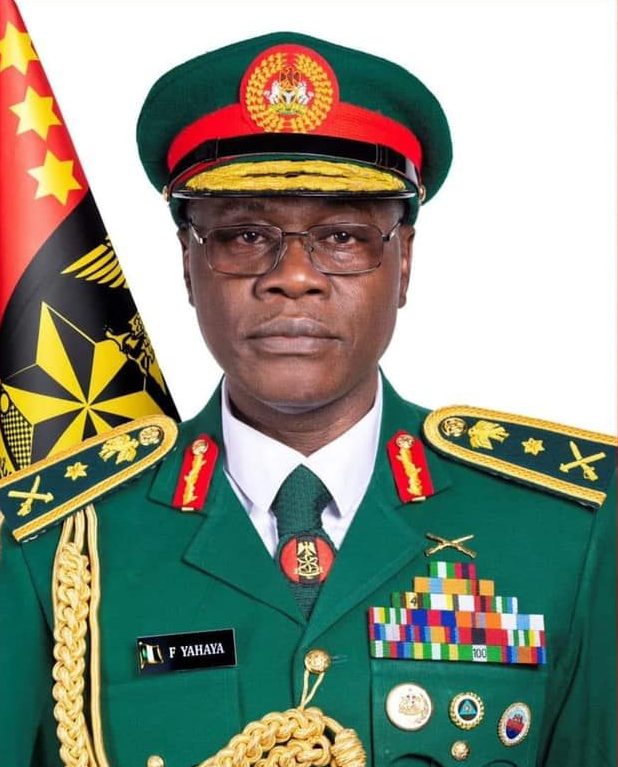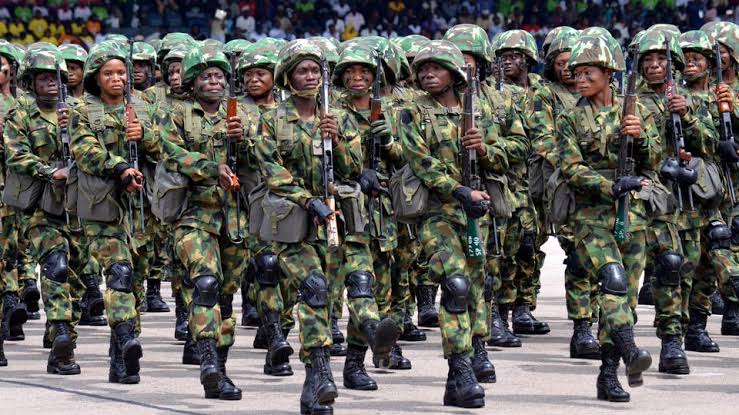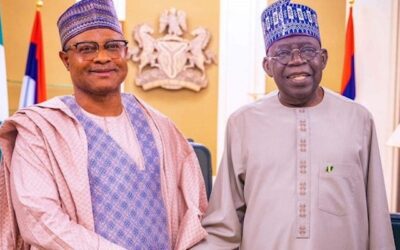Fund the Army, Win the Peace: Yahaya’s Clarion Call

What will Nigerians say, and who will they blame should the insecurity problems in the country persist or worsen in 2022? Truth is, should the nation fail to adequately plan to tackle internal threats and insecurity in various parts of the country, she may find herself in a more dire condition.
***
From the media space alone that is usually regaled with unsavoury reports, one can easily draw up a list of Nigeria’s security problems – from the ubiquitous farmer-herder conflict to banditry, insurgency, robbery, kidnappings, abductions, and secessionist agitations.
The list expanded over time, and remains intimidating, even though much has been done and achieved in curtailing insecurity in the country. With the broad range of security challenges confronting Nigeria, even a casual observer would readily agree that the country needs to step up its game to avoid being overwhelmed by this huge baggage of problems as it was for some months sometime this year. Steady development in the various aspects of the nation’s life is contingent upon a stable and secure polity.
Insecurity, for example, has battered the nation’s agricultural sector and brought about unprecedented rise in the prices of food and other commodities. Insecurity has also brought about much instability in the educational system, especially in communities within or around the theatres of conflict. The expectation therefore would be that there is a remarkable increase in what is budgeted for security on an annual basis. This looks pretty much so since the country’s security needs are largely import-dependent.
It is quite surprising, however, that the finance and budget offices of the Federal Government see things differently. This is evident in the recently slashed minimal budgetary request of N710 billion made by the Nigerian Army to N579 billion.
The Nigerian Army has been lamenting the negative impact this sharp reduction can have on national security in 2022.
The Chief of Army Staff, Lt. General Faruk Yahaya who appeared before the Senate Committee on Army last week stated that the reduction which was carried out by the Federal Ministry of Finance and the Budget Office was unhealthy amid heightening insecurity in the nation.
The Army Chief pleaded with the lawmakers to help remove the military from the envelope budgeting system which he maintained was hampering their operations.
In General Yahaya’s words, “In preparing for the year 2022 budget, the Nigerian Army (NA) proposed about the sum of N710 billion only. However, the Federal Ministry of Finance, Budget and National Planning budget ceiling reduced it to a total sum of Five Hundred and Seventy-Nine Billion Naira (N579b) only.
“This reduction would impede the capacity and tempo of the Nigerian Army in carrying out its constitutional duties particularly the ongoing war against Boko Haram terrorists and other criminalities across the country.”
Read Also: Nigerian Army Vows to Step Up Combat Strategy Against Boko Haram Terrorists in 2021
General Yahaya also appealed to the Senate Committee to intervene so that its capital budget releases would be within the first quarter of 2022.
“The timely and complete implementation of the year 2022 budget will thus enhance the fulfillment of the NA’s constitutional mandate and thus engender peace for socio-economic development of our country Nigeria,” he stressed.
Looking at the issue of budgeting and timely release of approved funds, it is regrettable that even among those in top government positions, not all seem to agree that the issue of adequate funding for the military is very critical to the effective prosecution of the war against insecurity in Nigeria.
Sadly, one could recall that last year, the first tranche of funding for the Nigerian military in the national budget was only made available to the Armed Forces in July 2020. A clear six months or more after budget approval! Without doubt, such cannot be the story of a nation that is at war and badly needs to crush insurgents, banditry and separatist agitations. Investing in infrastructure development when adequate national security is lacking is a futile venture in many ramifications. With the kind of challenges facing Nigeria, funding security should be a top priority.
The consistent altruism shown by the military in their efforts in keeping the country together, and making all attempts to secure the country from various attacks is commendable.
This year alone, thousands of Boko Haram terrorists have surrendered or have been silenced. The military has intercepted innumerable offensives and destroyed major operation hideouts of terrorists in the North-East and North-West. The NA has indeed shown its capacity to deliver results when necessary measures and funding are put in place by the Nigerian Government.
Many observers have noted that between securing the Nigerian polity and protecting lives and property in the protracted fight against insurgency, the task of the Nigerian military has largely been upset by funding. The provision of some equipment no doubt have been remarkably forthcoming in recent times. The arrival of the Tucano fighter planes from America and high-mobility armoured tanks from China is heartwarming. But the aircrafts, for example, were paid for over three years ago. This underscores the importance of critical mid- and long-term planning. There is no magic or miracle in the terrain of securing the nation.

However, It would be clearly counter-productive to subvert whatever gains could be made from these efforts with poor funding.
Even the chairman of the Senate Army Committee, Senator Mohammed Ali Ndume, who spoke after the presentation by the Chief of Army Staff, readily agreed that there is the challenge of inadequate funding and added that it is wrong to put the security agencies in envelope budgeting like other departments.
His words: “As a committee, the budgetary allocations proposed for the Nigerian Army in 2022 is grossly inadequate, the very reason envelope budgeting should not be used for the military at this time of serious security challenges in the country. We shall push for their exclusion from the system and inclusion in the first line charge.”
Many analysts believe that funding is one key reason behind the inability of the Nigerian Army to live up to its full potential in recent decades. Developed countries like China and the United States boast of the best armed forces in the world because they exhaustively fund their military, and aid their advancement in technology. If it is better funded, the same undoubtedly can be achieved with the Nigerian Army that has shown remarkable potential.
Read Also: High Expectations as New Service Chiefs Take Over
The World Bank and International Monetary Fund (IMF) recommended at least 1.5 percent of a nation’s GDP on security. The recommendation was for countries without security issues. It is remarkably higher in countries facing serious security challenges.
Shockingly, for a country with security challenges, the spending on the Nigerian military has witnessed a steady decline in the last five years. In 2015, Nigeria’s military spending was $2.07 billion which was a 12.39% decline from 2014. The defense budget saw a 16.57% decline in 2016 with an estimate of $1.72 billion. This was followed by a 5.92% decline in 2017 with a budget estimate of $1.62 billion. 2018 witnessed a 26.02% increase with an estimate of $2.04 billion. The defense budget in 2019 however saw a significant -8.95% drop with an estimate of $1.8 billion, and an estimate of $1.2 billion in 2020.
With the current spate of insurgency and other related issues of insecurity in the country, the Nigerian Army still has a lot to do especially in trenches and tactical research, training, asymmetric warfare, and armament development. This is the only known practical way it could challenge headlong the new realities of insurgency, banditry, kidnapping, and fundamentalist ethnicism spread across various parts of the country.
Presently, the Nigerian Army is actively engaged in containing one conflict situation or the other in 33 out if 36 states. Yet, we’re talking of an army of just 120,000 officers and soldiers.
It can never be overemphasized that critical to effectively prosecuting and closing the war in the Northeast and containing other security threats in the country is the issue of funding for the military. Fighting a counter-insurgency war will require a lot of resolve by the government to see the battle to a clear and logical conclusion. Such resolve can only be demonstrated by how much the country is ready to commit to the fight in terms of funding.
As I have stated elsewhere, ‘It is only with funding that the numerical strength of the military, and its weaponry, can be increased to the required levels. But the current financial state of the Nigerian military does not indicate that expected level of readiness.
“If Nigeria does not respond to the call for her to multiply her human power and firepower, she would continue to live with insurgency, banditry and sooner or later contend with more insurgencies from other parts of the country and the real threat of extinction.’
Prioritising national security is important but meeting it up with exhaustive funding is decisive in achieving victory. We cannot afford to underfund the Nigerian Army in crucial times like this. Chairman, Senate Committee on the Army, Senator Ndume said recently, ‘Nigeria is at war, the whole of the Nigeria Army budget is about $1.3m. That’s at the level of Niger, Chad, Sudan, and other poor countries.’
A significant increase in the budget for the military should be of critical concern to all stakeholders in the future of this country. Making the appropriated funds available on time is also crucial to national security. There can be no better motivation for the officers and men of the Nigerian military than to make available to them sophisticated armoury, technology, welfare and intelligence to battle threats to the sovereignty of the nation, and to ensure the peaceful coexistence and prosperity of their countrymen and women.


